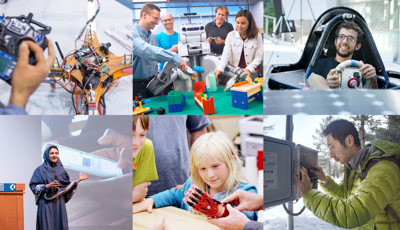Professor Alexandre Bayen was recently interviewed by CBS’ Smartplanet, a new online channel from CBS. The interview focused on Mobile Millennium, a traffic information system built jointly by Nokia, Navteq and UC Berkeley, in partnership with the US Department of Transportation and the California Department of Transportation. View two minute interview.
Nanotechnology
Professor Holger Schmidt
Prof. Holger Schmidt received an M.S. degree in physics from the University of Stuttgart, Stuttgart, Germany, in 1994 and M.S. and Ph.D. degrees in electrical and computer engineering from the University of California, Santa Barbara, in 1995 and 1999, respectively. After serving as a Postdoctoral Fellow with
the Massachusetts Institute of Technology, Cambridge, he joined the University of California, Santa Cruz, in 2001, where he is currently a Professor of electrical engineering and Director of the W.M. Keck Center for Nanoscale Optofluidics.
Professor Nader Pourmand
Dr. Pourmand is the head of the Biosensors and Bioelectrical Technology Group, as well as, director of the Genome Sequencing Center at UCSC’s Baskin School of Engineering. Dr. Pourmand’s ongoing research strives to develop new techniques and assays for biomedical applications. Because the nature of science is ever changing, Dr. Pourmand and his team of researchers work diligently in order to be innovative and proactive when it comes to research, collaboration, and discovery.
Professor Nobuhiko P. Kobayashi
Research Areas
Physics and chemistry of complex functional materials; group III-V compound semiconductor nanometer-scale structures and devices; mixed oxide nanometer-scale structures and devices; tailored nano-micrometer-scale hybrid semiconductor structures for energy conversion devices and advanced electronics
Michael Isaacson
Associate Dean of Research and Graduate Studies, Professor
University of California, Santa Cruz
Marvell Lab featured in Wall Street Journal
A recent WSJ article discusses the Marvell Nanofabrication Laboratory and its founders.
Capture of Nanomagnetic ‘Fingerprints’ a Boost for Next-Generation Information Storage Media
A team of physicists at UC Davis has developed a
technique to capture the magnetic “fingerprints” of certain nanostructures —
even when they are buried within the boards and junctions of an electronic
device
CITRIS Research Exchange schedule
The spring semester schedule for the CITRIS Research Exchange is now online.
Kai Liu
Professor Kai Liu joined UC Davis in 2001. His research interest is in experimental studies of nanostructured materials for nanomagnetism, spin-transport, and advanced energy explorations. Due to their intricate nanostructures, extremely small length scales, rich surfaces and interfaces, low dimensionality, and interplay among constituents, nanostructured materials often exhibit new and enhanced properties over their bulk counterparts. Additionally, these novel properties can be tailored through extra degrees of freedom, such as structure and material.
The Future of Optical Networking
Imagine an Internet connection that's 10,000 times faster. A group of
CITRIS researchers are developing the technology that will make that
goal a reality.
A Nano-Scale Lab with Societal-Scale Impact
Construction is underway on CITRIS's new headquarters. Its Nanolab
Center is part of a coordinated investment in the nanotech
infrastructure of tomorrow.
Luke Lee
Professor Luke Lee is Lloyd Distinguished Professor of Bioengineering at UC Berkeley. He is also Director of Biomolecular Nanotechnology Center and Co-Director of Berkeley Sensor & Actuator Center. He was Chair Professor in Systems Nanobiology at the Swiss Federal Institute of Technology (ETH, Zurich). He received both his B.A. in Biophysics and Ph.D. in Applied Physics/Bioengineering from UC Berkeley.
Professor Liwei Lin
Professor Liwei Lin currently serves as Chancellor’s Professor of the Department of Mechanical Engineering at the University of California, Berkeley, and Co-Director of the Berkeley Sensor and Actuator Center.
Albert Pisano
Research Interests:
Primary: Invention, design, fabrication, modeling and optimization of micro electromechanical systems (MEMS): harsh environment sensors, micro thermal heat management devices for integrated circuits, micro power generation devices, micro and nano resonators for RF communication, micro fluidic systems for drug delivery, micro inertial instruments, micro information storage systems and nanoimprinted sensors & electronics. Secondary: Optimal mechanical design. Kinematics and dynamics of machines.








